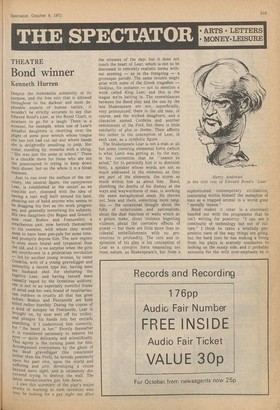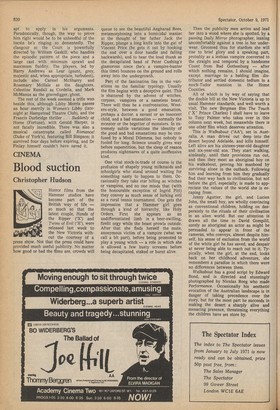THE SPECTATOR
• ARTS • LETTERS • MONEY•LEISUREi THEATRE
Bond winner
Kenneth Hurren
Despite the formidable solemnity of its purpose, and the free rein that is allowed throughout to the darkest and most deplorable aspects of human nature, it wouldn't be strictly accurate to say that Edward Bond's Lear, at the Royal Court, is nowhere to go for a laugh. There is a moment, for example, when one of Lear's dreadful daughters is chortling over the Plight of some poor wretch whose tongue she has just had cut out and whose hands she is delightedly smashing to pulp. Her sister, standing by, remarks with a shrug, " She was just the same at school." There IS a chuckle there for those who are not too preoccupied in trying to keep down their dinner, but on the whole it is a bleak business.
Just to run over the surface of the territory, the central figure, the eponymous Lear, is established at the outset as an irascible sort, obsessed with the idea of having a vast wall built around his land, shooting out of hand anyone who seems to be dragging his feet as the work progresses, and generally terrorizing his subjects. His two daughters (for Regan and Goneril, now read Bodice and Fontanelle), a treacherous pair, now betroth themselves to his enemies, with whom they would seem to have been pen-pals for some time, and promptly depose him. The new regime iS even more brutal and tyrannical than the old, and it is no surprise when the girls are overthrown in a proletarian revolution — led by another young woman, by name Cordelia, wife of a youhg gravedigger and ostensibly a decent type but, having seen her husband shot for sheltering the fugitive Lear, and having herself been casually raped by the licentious soldiery, She is not in an especially merciful frame Of mind and her own brand of totalitariann outdoes in cruelty all that has gone
before. Bodice and Fontanelle are both ' killed rather horribly. During the course of a kind of autopsy on Fontanelle, Lear is brought on, by now well off his trolley, and plunges his hands into her entrails searching, if I understood him correctly, for "the beast in her." Shortly thereafter it is considered necessary to remove his eYes — quite delicately and scientifically. This agony is the turning point for him. Accompanied everywhere by the ghost of the dead gravedigger (his conscience rather than his Fool), he broods penitently Upon his past sins, upon the world and suffering and pity, developing a vision beyond mere sight, and is ultimately discovered trying to destroy the wall. The latest revolutionaries gun him down.
I owe this summary of the play's major events in warning to rash investors who may be looking for a gay night out after the stresses of the day; but it does not touch the heart of Lear, which is not to be discussed in remotely realistic terms without seeming — as in the foregoing — a grotesque parody. The same trouble might arise with some of the Greek tragedies — Oedipus, for instance — not to mention a work called King Lear, and this is the league we're batting in. The resemblances between the Bond play and the one by the late Shakespeare are not, superficially, very pronounced: there is the old man, of course, and the wicked daughters, and a character named Cordelia and another reminiscent of the Fool, but there is little similarity of plot or theme. Their affinity lies rather in the conception of Lear, in each case, as a symbolic figure.
The Shakespeare Lear is not a man at all but some towering elemental force (which is what Lamb was getting at, by the way, in his contention that he "cannot be acted," for to personify him is to diminish him), a speaker whose words are not so much addressed to the elements as they are part of the elements, the storm as much within him as about him. Bond, plumbing the depths of his dismay at the ways and waywardness of man, is working the same metaphysical seam. He throws out, here and there, something more tangible — the occasional thought about the folly of isolationism and nationalism, about the dual function of walls which do a prison make, about violence begetting violence, about the corrosive effects of power — but these are little more than incidental embellishments with no pretensions to profundity. The core and inspiration of his play is his conception of Lear as a synoptic force emanating not from nature, as Shakespeare's, but from a sophisticated contemporary civilization, containing within himself the metaphor of man as a trapped animal in a world gone "morally insane."
Bond makes it clear in a statement handed out with the programme that he isn't writing for posterity: "I can see a continuity of technology but not of culture." I think he takes a woefully pessimistic view of the way things are going, but the hard time he has making a living from his plays is scarcely conducive to looking on the sunny side, and it probably accounts for the wild over-emphasis he is apt to apply in his arguments. Paradoxically, though, the way to prove him right would be to be unheedful of the tocsin he's ringing so dementedly. The clangour at the Court is powerfully directed by William Gaskill, who handles the episodic pattern of the piece and a large cast with minimum sprawl and maximum fluidity. The players, led by Harry Andrews as Lear (gaunt, grey, majestic and, when appropriate, turbulent), include also Carmel McSharry and Rosemary McHale as the daughters, Celestine Randall as Cordelia, and Mark McManus as the gravedigger/ghost. The rest of the week seemed a trifle wan beside this, although Libby Morris passes an hour merrily in Women's Libby (latenight at Hampstead Theatre Club), and the Francis Durbridge thriller . . . Suddenly at Home (Fortune), with Gerald Harper, is not fatally incredible. There was also a musical catastrophe called Romance! (Duke of York's), featuring Bill Simpson; it survived four days before expiring, and Dr Finlay himself couldn't have saved it.











































 Previous page
Previous page